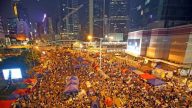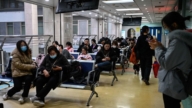【新唐人2014年10月01日訊】香港「佔中」行動9月30號進入第三天。當天的白天,「佔中」民眾的人數雖有減少,但到了傍晚時份,前往各佔領區的市民愈來愈多。面對動盪的香港局勢,很多人不禁要問,這對香港,甚至對中國大陸來說,會產生甚麼樣的衝擊呢。我們一起來看下面的報導。
9月29號早上,香港金融管理局宣佈啟動緊急應變措施。金融管理局表示,因應中區及其他地區出現的公共秩序情況,已聯同受影響銀行,啟動應變預案,以確保銀行體系核心功能的正常運作。金管局還表示,有需要時,會按現有機制,向銀行體系提供流動資金支持。
30號早上,金管局發聲明說,截至早上9點,共有21家銀行的37個分行營業據點受「佔中」的影響,而暫時關閉。金管局還說,由於受影響地區不能進行正常運鈔及支票交收運作,這些地區的銀行自動櫃員機服務也將陸續暫停。
香港《開放》雜誌總編輯金鐘:「整個佔中的訴求就是爭取香港未來的特首的選舉,能夠真正的做到公開公平的普選,他們動用武力,催淚彈,80多顆催淚彈拿出來,用這種暴力的手段來鎮壓手無寸鐵的青年學生,就把香港人激怒了,因此昨天星期一,這個佔中就變成佔領香港了,香港四大商業區都被佔領了,都被癱瘓,所以現在這個局勢就發展的特別快,而且特別嚴重。」
據了解,已有多家企業員工響應學聯呼籲的罷工行動,包括電訊業的CSL和PCCW及恆生、中銀、渣打等銀行。美國《華爾街日報》指出,抗議活動打擊了香港的金融業。繼前一天下跌1.9%之後,香港股市30號早盤下跌1%。觸及了兩個半月以來的最低水平。
美國南卡羅萊納大學艾肯商學院教授謝田:「如果佔中繼續進行,香港很多經濟活動、商務活動、金融活動可能都會受到影響。而如果香港金融和香港市場受到衝擊,也會直接影響中國的經濟和中國的金融。如果事件繼續惡化,香港政府拒絕讓步的話,佔中表示會提高抗爭的事態,可能出現全香港的罷市、罷課、罷工,這樣的話,會更深刻的影響到香港經濟和中國經濟。」
投資者學會主席譚紹興向《德國之聲》表示,「佔中」行動對金融界的短期影響應該不大,但中共提出的政改方案會給香港的經濟帶來長遠的影響。香港的吸引力其實在於一個「自由」的金融中心。政改以後,很多投資者會考慮,到底香港還是不是那麼「自由」,是不是還值得在香港投資。
上海證券交易所日前公布了滬港通規則,有望在10月27號開通,但目前「佔中」行動遍地開花,滬港通是否會被延遲或叫停,成為外界關注的焦點。
謝田:「現在看來香港政府有很多活動,政治活動、經濟活動都已經停擺,而這個滬港通呢,我看肯定要受到延遲,香港股市都不能正常運作的話,滬港通也沒辦法進行。」
美國南卡羅萊納大學艾肯商學院教授謝田指出,不僅中國的經濟會受到衝擊,如果中共當局不能妥善處理香港的抗議活動,可能導致政權的全面崩潰。
謝田:「雖然中共現在封鎖的很緊,非常有限的讓老百姓知道一些佔中的影響,但是通過互聯網等各種渠道,很多消息都會不同程度的進入中國大陸,這對那些對中共統治已經忍不可忍的中國民眾來說,可能是一個積極的鼓勵和信號,會導致中共政權從香港開始,一直到中國大陸的崩潰。」
有媒體指出,中共領導人習近平正面臨艱難的抉擇,香港發生抗議活動,如果聽之任之,可能會鼓勵中國其他地方的人群起效仿,但若中共軍隊介入清場,大陸民眾就會起來支持香港民眾,整個「倒共」局勢就會一觸即發。
採訪/陳漢 編輯/陳潔 後製/曜逵
Hong Kong Situation Unsteady, How Much Affect on China?
Sept. 30, numbers of protesters of Occupy Central reduced, but byevening, numbers of citizens joining the event increased. Facing Hong Kong’s unsteady situation, many people questioned:what would be the impact of the event on Hong Kong and Mainland China?
Let’s take a look.
On the morning of Sept. 29, the Hong Kong Monetary Authority (HKMA) took emergency measures. HKMA says that in view of the public order situation in Central and other areas, HKMA and affected banks have activated their business continuity plans to maintain normal operations of core functions of the banking system. HKMA will also inject liquidity into the banking systems as and when necessary under the established mechanism.
On the morning of Sept. 30, HKMA released a statement. It says that as of updated news at 9 a.m., 21 banks and 37 branches were affected by Occupy Central, and have to be temporarily shut down. HKMA says the affected areas couldn’t operate normally, cash machine services will gradually be withdrawn.
Jin Zhong, chief editor of Hong Kong’s Open Magazine: “Occupy Central aims at obtaining future universal suffrage for the chief executive. Thus election should be achieved genuinely, openly and fairly. The police used brutal suppression and over 80 tear gas rounds to attack young unarmed students, arousing Hongkongers’ anger. From Monday yesterday, the Occupy Central became Occupy Hong Kong. Four major business areas were occupied, the systems in the areas were collapsed. So the current situation developed very fast, very serious.”
Sources say that staff of several companies echoed the students’ strike. This includes CSL, PCCW, Hang Seng Bank, Bank of China, Standard Chartered Bank and more. The Wall Street Journal reported that the protest affected Hong Kong’s financial sectors. The stock dropped 1.9 percent one day earlier, today’s stock dropped 1 percent. It reached its lowest for two and a half months.
Frank Xie, Professor of Business School, University of South Carolina Aiken: “If Occupy Central continues many economic, commercial and financial events will be affected in Hong Kong. If Hong Kong’s financial and market are affected, it will directly influence China’s economy and finance. If the incident gets worse, Hong Kong authority refuses to make a concession, Occupy Central says they will upgrade the protests, likely the whole of Hong Kong will be on strike. In this regard, it will further affect Hong Kong and China’s economy.”
Tam Siu-hing, Chairman of Hong Kong Institute of Investors told DW that Occupy Central will not greatly affect financial sectors in the short term. But China’s political reform plan would affect Hong Kong’s economy in the long term. Hong Kong’s attraction is linked to freedom of its financial center. After the political reform, many investors will wonder whether Hong Kong is free? Or is it worth to invest in Hong Kong?
Shanghai Stock Exchange released Shanghai-Hong Kong Stock Connect program. It is expected to be implemented on Oct. 27. However, will Occupy Central movement delay or stop the Stock Connect? It becomes a concern to observers.
Frank Xie: “Hong Kong government has many activities. Political events and economic events have stopped. Regarding the Stock Connect, it likely would be postponed. Hong Kong’s stock market couldn’t operate normally, the Stock Connect would be the same.”
Frank Xie points out that not only China’s economy would be affected, if the regime cannot handle the protest properly, it also would cause the Chinese Communist Party’s (CCP) power to completely collapse.
Frank Xie: “Although China blocks information tightly, and Chinese people have very limited information about Occupy Central’s influence; through various channels ie the internet, news has reached Mainland China. For Chinese citizens who can no longer tolerate CCP rule, it could be a positive encouragement and signal. It could start from Hong Kong then to Mainland, CCP’s rule will collapse.”
Some media report that Xi Jinping is facing a difficult choice. Regarding Hong Kong’s protest, if they let it be, it could encourage Chinese people to follow. If the CCP army intervenes, Mainland Chinese would stand up to support Hong Kong people. The movement of “down with the CCP” would be triggered at any moment.
Interview/ChenHan Edit/ChenJie Post-Production/YaoKui























